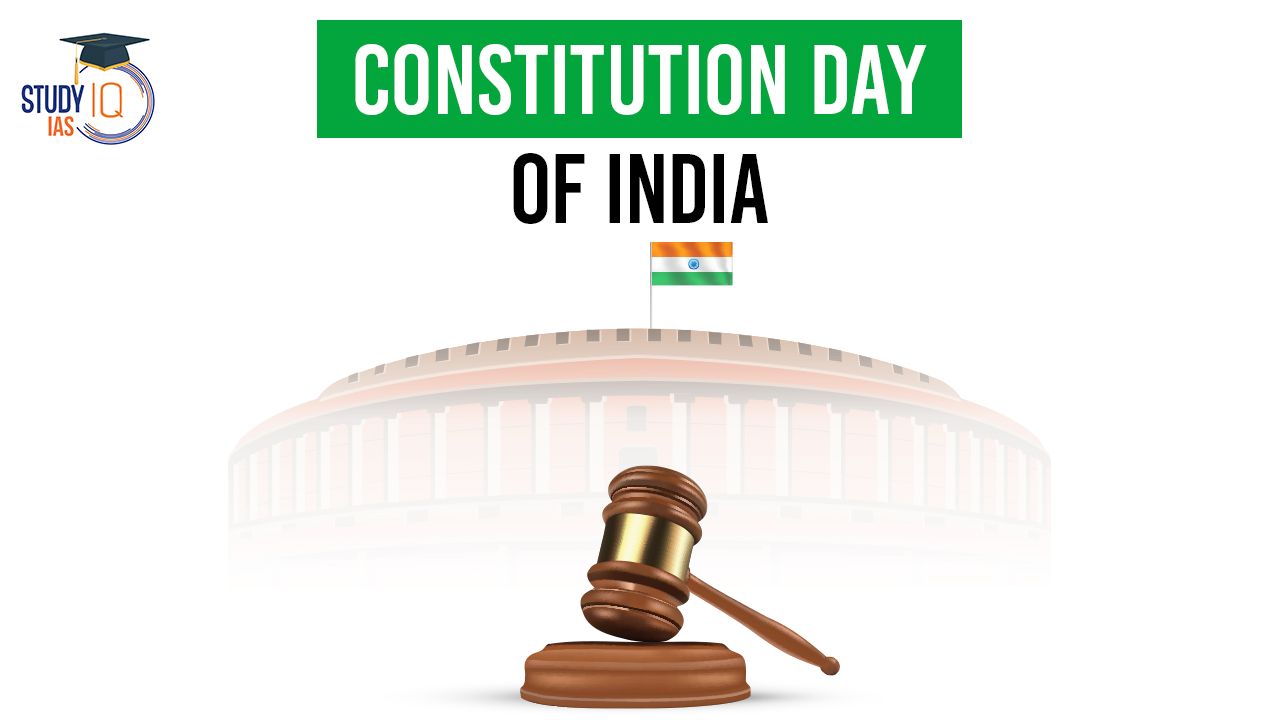Table of Contents
Every year on November 26, India observes Constitution Day (Samvidhan Diwas) to commemorate the adoption of its Constitution in 1949. This day not only celebrates the monumental achievement of drafting the world’s longest written Constitution but also emphasizes the principles that guide India as a sovereign, democratic republic. Interestingly, Constitution Day was earlier known as National Law Day before being officially renamed in 2015.
This article explores the history, significance, and celebrations of Constitution Day, its evolution from National Law Day, and how it differs from other national observances like Republic Day.
What is Constitution Day?
Constitution Day, also recognized as National Law Day, is observed annually on the 26th of November. This day holds historical significance as it marks the formal adoption of the Constitution of India by the Constituent Assembly on November 26, 1949. The Constitution, which came into effect on the 26th of January 1950, signifies India’s transition to a republic.
The Ministry of Social Justice and Empowerment, on the 19th of November 2015, officially declared the government’s decision to celebrate the 26th of November as ‘Constitution Day.’ This occasion serves as a reminder of the foundational principles enshrined in the Constitution and fosters awareness and appreciation for the legal framework that governs the nation.
Difference Between Constitution Day and Republic Day
| Aspect | Constitution Day | Republic Day |
|---|---|---|
| Date | November 26 | January 26 |
| Significance | Adoption of the Constitution | Implementation of the Constitution |
| Focus | Constitutional awareness | Celebration of national identity |
| Celebration Style | Seminars, readings, and discussions | Parades, cultural programs, and awards |
B.R Ambedkar Architect of Indian Constitution
Dr. B.R. Ambedkar, the main creator of the Constitution, was essential in designing its rules to guarantee social justice and equality for everyone, especially for marginalized communities. His work to include fundamental rights and promote equality helped build a fair society. His legacy still inspires movements for social justice and human rights in India today.
History of Constitution Day
| History of Framing |
|
Constituent Assembly
- Bengal Narasimha Rao: Key figure in drafting the Constitution and served as Constitutional Advisor.
- Established: The Assembly was set up under the Cabinet Mission Plan of 1946.
- Members: 389 total, with 292 from provinces, 93 from states, 3 from Chief Commissioner Provinces, and 1 from Baluchistan.
- First Meeting: Held on December 9, 1946, chaired by Dr. Sachchidananda Sinha, the senior-most member.
- Permanent Speaker: Dr. Rajendra Prasad was elected on December 11, 1946.
- Muslim League Boycott: They boycotted the first meeting, leading Winston Churchill to liken it to a wedding without the bride.
- Committees: The Assembly formed 13 committees for drafting the Constitution, including 8 major ones:
- Drafting Committee: B. R. Ambedkar
- Union Power Committee: Jawaharlal Nehru
- Union Constitution Committee: Jawaharlal Nehru
- Provincial Constitution Committee: Vallabhbhai Patel
- Advisory Committee on Rights: Vallabhbhai Patel
- Rules of Procedure Committee: Rajendra Prasad
- States Committee: Jawaharlal Nehru
- Steering Committee: Rajendra Prasad
- Reassembled: On August 14, 1947, as a sovereign body, taking over from the British Parliament.
Celebration of Constitution Day
Across India, Constitution Day is observed with a variety of activities to spread awareness about the Constitution and its values:
- Preamble Reading:
Institutions and workplaces organize Preamble recitations to emphasize constitutional ideals. - Educational Events:
Schools and colleges host essay competitions, debates, and quizzes on constitutional themes to engage younger audiences. - Public Discussions:
Forums and seminars discuss the relevance of the Constitution in modern governance. - Digital Campaigns:
Social media platforms are used to promote constitutional literacy with hashtags, infographics, and videos. - Government Initiatives:
Public readings, speeches by dignitaries, and awareness drives are common today.
Significance of Constitution Day
Constitution Day holds immense significance as it commemorates the adoption of India’s Constitution:
- Foundational Document: Marks the adoption of the Constitution on November 26, 1949.
- Democratic Values: Reinforces democratic principles and the rule of law.
- Awareness and Education: Promotes understanding of constitutional rights and duties.
- Patriotism: Fosters a sense of national pride and unity.
- Constitutional Commitment: Reaffirms the commitment to constitutional ideals and values.
- Educational Initiatives: Encourages schools and institutions to conduct programs on the Constitution.
- Historical Reflection: Offers an opportunity to reflect on the visionary contributions of the Constituent Assembly.
- Citizen Empowerment: Aims to empower citizens with knowledge about their fundamental rights and responsibilities.
Constitution Day of India UPSC
Constitution Day, or ‘Samvidhan Divas,’ is observed annually on November 26th in India to mark the adoption of the Constitution. Recognized by the Ministry of Social Justice and Empowerment on November 19, 2015, the government designated this day to enhance awareness and promote constitutional values among citizens. Celebrated on the anniversary of the Constitution’s formal adoption by the Constituent Assembly, Constitution Day encourages reflection on the foundational principles that guide India’s governance. This commemoration underscores the significance of democratic ideals and the role of citizens in upholding the values enshrined in the Constitution.


 List of Indian State Animals with their ...
List of Indian State Animals with their ...
 World Heritage Day 2025, Theme, Objectiv...
World Heritage Day 2025, Theme, Objectiv...
 New Phase of Operation Chakra to Combat ...
New Phase of Operation Chakra to Combat ...





















